Hull - East Riding
Londesborough Barracks, Londesborough street
Artillery Barracks, Park street
Colonial street [Colonial street is at the corner of Park street]
Wenlock Barracks, Anlaby road
Walton street
Artillery Barracks, Park street
Colonial street [Colonial street is at the corner of Park street]
Wenlock Barracks, Anlaby road
Walton street
HQ, A-F 4 East Yorkshire
1st Volunteer Battalion The East Yorkshire Regiment (late 1st East Riding Yorkshire)
HQ, A-D 5 East Yorkshire Regiment
2nd East Riding of Yorkshire Volunteer Artillery (W.D.R.G.A.) Head quarters - Park Street Barracks
HQ, 1st and 2nd East Riding Batteries, Ammunition Column 2nd Northumbrian Brigade RFA, Wenlock Barracks, Anlaby Road
HQ, Nos 1,2,3,4 Companies East Riding RGA
HQ, 1 Wks, 2 E Lights Companies East Riding Fortress RE, Colonial street
East Riding of Yorkshire (Fortress) Royal Engineers, Colonial St (Kelly, 1913)
'A' Squadron East Riding Yeomanry Walton Street
York & Durham Brigade Coy Northumbrian ASC Walton Street
HQ, A, B, C Sect 3rd Northumbrian Field Ambulance RAMC Walton Street
This description is also found in Brown's Illustrated Guide to Hull, 1891, page 127, which sets the Rifle Barracks in its context within a Victorian maritime port. Close by was an orphanage which sheltered 'homeless orphans arising from Commerce and Navigation' and adjoining it was an old hospital building in use as a school.
The 1st East York Rifle Volunteer Corps became the 1st Volunteer Battalion East Yorkshire Regiment, and following the Territorial reforms of 1908, 4th Battalion East Yorkshire Regiment. The Headquarters and A-F companies were based at Londesborough Street Barracks.
Hull County Council has included the Londesborough Barracks on the Local Buildings List as a building which 'helps form the character and history of the city. It is described as:
The actual riding school part was demolished many years ago, but we understand that the barrack complex was 'L' shaped and part of that remains today as Wenlock Barracks (fronting onto Anlaby Road), still used by the TA (B (250 Hull) Squadron, 5 Medical GS Regiment) and Cadets.
1st Volunteer Battalion The East Yorkshire Regiment (late 1st East Riding Yorkshire)
HQ, A-D 5 East Yorkshire Regiment
2nd East Riding of Yorkshire Volunteer Artillery (W.D.R.G.A.) Head quarters - Park Street Barracks
HQ, 1st and 2nd East Riding Batteries, Ammunition Column 2nd Northumbrian Brigade RFA, Wenlock Barracks, Anlaby Road
HQ, Nos 1,2,3,4 Companies East Riding RGA
HQ, 1 Wks, 2 E Lights Companies East Riding Fortress RE, Colonial street
East Riding of Yorkshire (Fortress) Royal Engineers, Colonial St (Kelly, 1913)
'A' Squadron East Riding Yeomanry Walton Street
York & Durham Brigade Coy Northumbrian ASC Walton Street
HQ, A, B, C Sect 3rd Northumbrian Field Ambulance RAMC Walton Street
Rifle Barracks, Londesbrough Barracks, Londesborough street, Hull
A History of Kingston on Hull' from Bulmer's Gazetteer (1892) describes:'The 1st East York Rifle Volunteer Corps was formed in 1859, and now comprises six companies, numbering about 600 men. The Londesborough Barracks in Londesborough Street are the head-quarters, and were built in 1864, at a cost of £2,200. The building is of plain white brick with red facings.
'The drill-room is 120 feet long by 60 feet wide, and at the ends are sergeants' quarters, the armoury, officers' rooms, stables, &c. Attached is a spacious drill ground for outdoor drill. The range for rifle practice is on the Humber bank, west of the town, and is available for firing from 100 to 1,000 yards.'
'The drill-room is 120 feet long by 60 feet wide, and at the ends are sergeants' quarters, the armoury, officers' rooms, stables, &c. Attached is a spacious drill ground for outdoor drill. The range for rifle practice is on the Humber bank, west of the town, and is available for firing from 100 to 1,000 yards.'
This description is also found in Brown's Illustrated Guide to Hull, 1891, page 127, which sets the Rifle Barracks in its context within a Victorian maritime port. Close by was an orphanage which sheltered 'homeless orphans arising from Commerce and Navigation' and adjoining it was an old hospital building in use as a school.
The 1st East York Rifle Volunteer Corps became the 1st Volunteer Battalion East Yorkshire Regiment, and following the Territorial reforms of 1908, 4th Battalion East Yorkshire Regiment. The Headquarters and A-F companies were based at Londesborough Street Barracks.
Hull County Council has included the Londesborough Barracks on the Local Buildings List as a building which 'helps form the character and history of the city. It is described as:
'Rare example of Victorian military architecture. Built 1864 by the 1st East York Rifle Volunteers (formed 1859). Distinctive and attractive use of 'white' brick with red brick dressings. North elevation (now whitewashed) of main frontage building features pleasing round-arched windows. Rifle Barracks originally comprised drill room, sergeants' quarters, armoury, officers' rooms, stables, etc.'
(Entry from Hull Local Buildings List 2008, dated 15.05.07, reproduced with permission.)
We are very grateful to Philip Hampel, Senior Conservation Officer, for the set of photographs and the piece from Brown's Guide. Thank you.
We are very grateful to Philip Hampel, Senior Conservation Officer, for the set of photographs and the piece from Brown's Guide. Thank you.
Artillery Barracks, Park street, Hull
'The 2nd East York Artillery Corps was formed in 1860, and now comprises 12 batteries, numbering over 900 men. The Barracks in Park Street were erected in 1870, for the purpose of the Workingmen's Art and Industrial Exhibition, and were then a series of wooden buildings covered with felting.
'In 1871, the Artillery Corps (whose head-quarters were then at the Corn Exchange, in High Street) purchased the buildings and leased the ground from the Corporation. The buildings have since been improved by concreting the walls and slating the roofs. They consist of a large drill hall, gun room, repository shed, mess room, adjutant's room, orderly room, band room, officers' and sergeants' billiard rooms, kitchens, &c. The drill hall will accommodate 3,000 persons, and is available for concerts, bazaars, and other large gatherings.
'Four 40 lbs. R.B.L. Armstrong guns are kept at these barracks, which are said to be one of the most complete volunteer barracks in the kingdom. In the area, in front of the building, are two guns, taken in the Crimean war. The brigade practises on the Humber bank, east of the town, and at Paull Point Fort, where it has two fixed guns of its own, and a battery of position has recently been formed.'
'In 1871, the Artillery Corps (whose head-quarters were then at the Corn Exchange, in High Street) purchased the buildings and leased the ground from the Corporation. The buildings have since been improved by concreting the walls and slating the roofs. They consist of a large drill hall, gun room, repository shed, mess room, adjutant's room, orderly room, band room, officers' and sergeants' billiard rooms, kitchens, &c. The drill hall will accommodate 3,000 persons, and is available for concerts, bazaars, and other large gatherings.
'Four 40 lbs. R.B.L. Armstrong guns are kept at these barracks, which are said to be one of the most complete volunteer barracks in the kingdom. In the area, in front of the building, are two guns, taken in the Crimean war. The brigade practises on the Humber bank, east of the town, and at Paull Point Fort, where it has two fixed guns of its own, and a battery of position has recently been formed.'
Source: A History of Kingston on Hull from Bulmer's Gazetteer (1892)
Wenlock Barracks, Anlaby road, Hull
Anlaby Road. HQ, 2nd Northumbrian Brigade RFA
(See Walton street.)Anlaby Road. HQ, 2nd Northumbrian Brigade RFA
Walton street - Riding School
The East Riding of Yorkshire Imperial Yeomanry had a Riding School & Gymnasium build on Walton street (opposite the fairground) in 1904/5; it was opened by the Colonel, Lord Wenlock, on 11th March, 1905.The actual riding school part was demolished many years ago, but we understand that the barrack complex was 'L' shaped and part of that remains today as Wenlock Barracks (fronting onto Anlaby Road), still used by the TA (B (250 Hull) Squadron, 5 Medical GS Regiment) and Cadets.
(Thank you to Neil H for the information.)
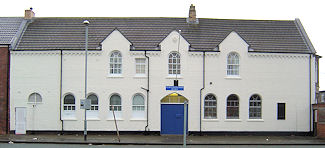
Londesborough Barracks
Photograph courtesy of Phillip Hampel
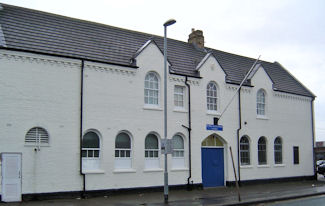
Londesborough Barracks
Photograph courtesy of Phillip Hampel
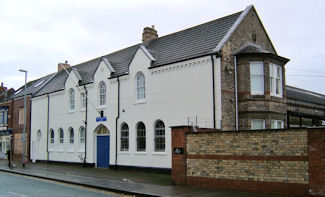
Londesborough Barracks
Photograph courtesy of Phillip Hampel
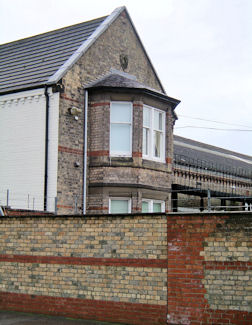
Londesborough Barracks
Photograph courtesy of Phillip Hampel
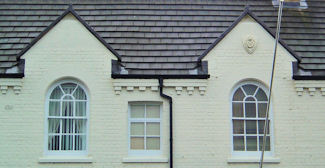
Londesborough Barrack - Gables with Crest
Photograph courtesy of Phillip Hampel
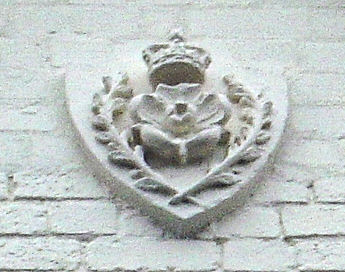
Londesborough Barrack - Close-up of Crest
Photograph courtesy of Phillip Hampel
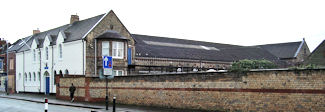
Londesborough Barrack - Side view
Photograph courtesy of Phillip Hampel
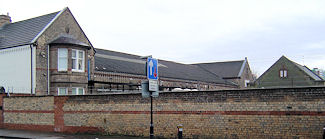
Londesborough Barracks - Side view
Photograph courtesy of Phillip Hampel
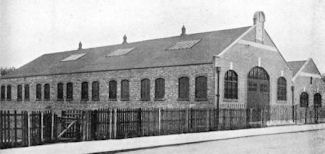
Riding School
Photograph courtesy of Neil H
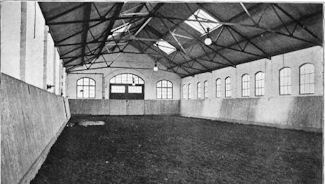
Riding School - Interior
Photograph courtesy of Neil H
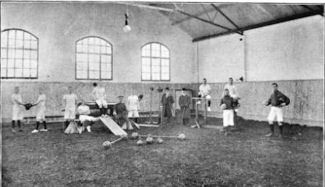
Riding School - Gymnasium
Photograph courtesy of Neil H
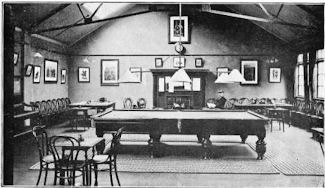
Riding School - Reading Room
Photograph courtesy of Neil H
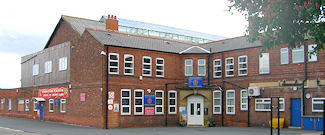
Wenlock Barracks
Photograph courtesy of Charles Dinsdale
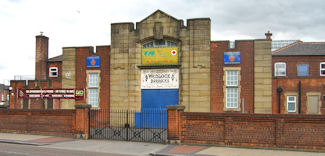
Wenlock Barracks
Photograph courtesy of Charles Dinsdale
© All material is copyright - refer to the
Terms of Use
the first attempt at content
Introduction
About
Anatomy
Drill
 Database
Database
 Memorabilia
Memorabilia
Resources Glossary
Saving Halls Participate Contact What's New? Terms of Use
Drill
 Database
Database Memorabilia
MemorabiliaResources Glossary
Saving Halls Participate Contact What's New? Terms of Use
The Drill Hall Project - Charting a neglected legacy